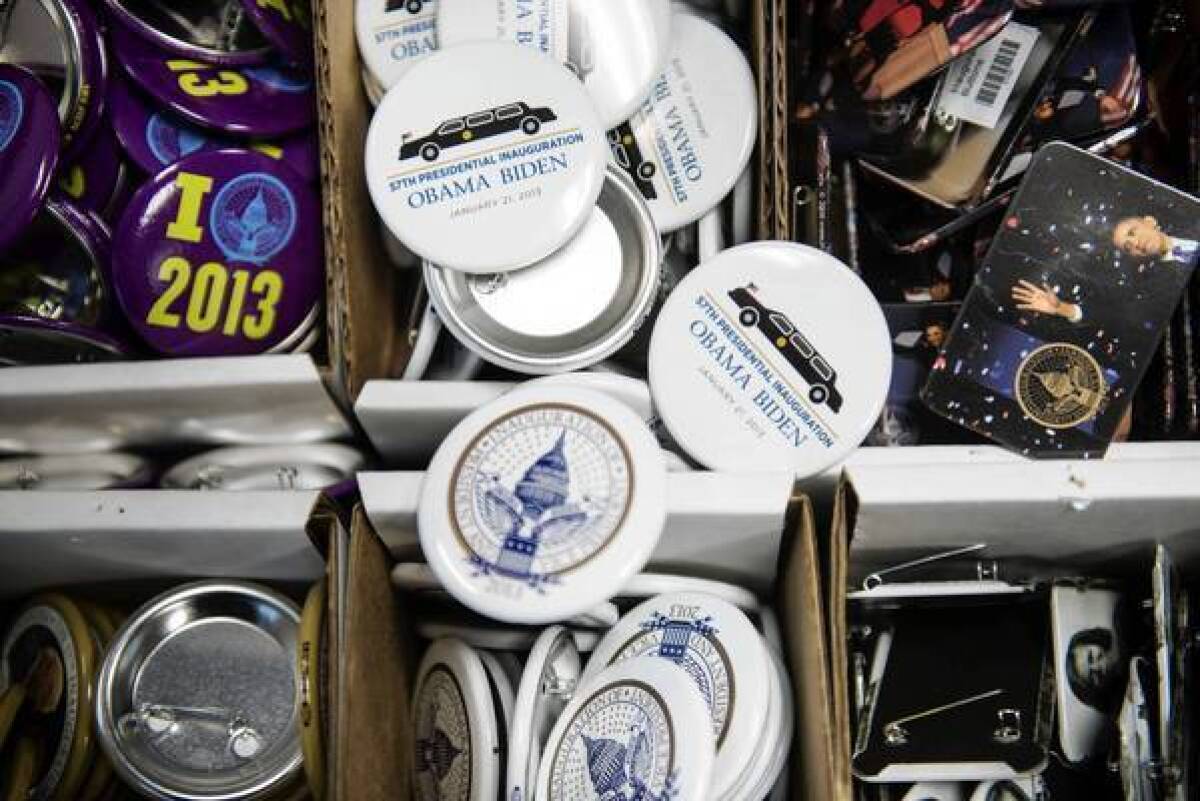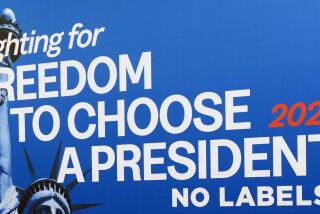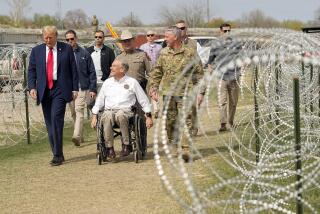Seeking to harness Obama’s campaign resources for a second term

WASHINGTON — As he launches his second term, President Obama may get help from an ambitious new political organization being built out of his reelection campaign, a group that could reshape how future presidents harness supporters to press their White House agendas.
Run by former Obama campaign officials, the advocacy group will seek to leverage the campaign’s sophisticated organizing tools and rich voter database to support the president’s policy objectives, including raising the debt ceiling, gun control and immigration reform.
If it is able to sustain the passion that propelled Obama twice into the White House, the pro-Obama group may outstrip the role played by traditional interest groups, from organized labor to the environmental movement, and could form an independent power base outside the White House and the Democratic Party.
“This just dwarfs any part of the Democratic coalition,” said Democratic strategist Joe Trippi. “This is the biggest leg of the stool. There are really significant implications in terms of the permanent power center within the party.”
Although details of the group’s structure — and its name — may be released Friday, the launch is set for Sunday, when 4,000 former campaign staff and volunteers are expected at a Washington hotel for a daylong event dubbed the Obama Campaign Legacy Conference. Thousands of supporters are expected to watch online.
PHOTOS: President Obama’s past
Even before its launch, Republicans described the group’s resources as a threat.
“Obama, who’s not going to be running for reelection, has an enormous database, a lot of political muscle, a machine, that I believe he intends to focus squarely on the House,” Rep. Greg Walden (R-Ore.), chairman of the National Republican Congressional Committee, told reporters Thursday at the House Republican Conference retreat in Williamsburg, Va. “So we have our work cut out for us.”
A similar effort fizzled after Obama first won the White House. In 2009, Obama campaign organizers also hoped to use its database, millions of email addresses and a corps of trained operatives to help push White House goals. But Organizing for America — then housed within the Democratic National Committee — played a limited role during the bitter debate over Obama’s healthcare overhaul, which barely squeaked through Congress.
Obama’s volunteer network was remobilized in the 2012 race, when the campaign used social media and other technology to connect supporters to their neighbors and friends. Supporters donated a record $1.1 billion — including $216 million in contributions of $200 or less, according to the nonpartisan Campaign Finance Institute.
Leadership for the new group has not been announced, but former Obama campaign manager Jim Messina and several other former campaign operatives are expected to play key roles. On Thursday, Messina sent out an email blast to Obama campaign supporters urging them to back the White House gun policy proposals.
Making the leap from a campaign built around the singular goal to one with a broader — and ongoing — mission is no easy task.
QUIZ: How much do you know about presidential inaugurations?
“Every presidential campaign struggles with the question of, ‘How do we handle our legacy?’” noted Republican election law attorney Michael Toner, who served as general counsel for George W. Bush‘s 2000 campaign. “This is fairly novel, and it’s rare to talk about trying to house this apart from the party. I think it’s very challenging, because the DNC will say, ‘What about us?’ Other candidates will say, ‘What about us?’ It’s very hard to finesse that.”
The organization will be set up as a 501(c)4 social welfare group, according to top Democrats privy to the discussions. That structure allows it to accept unlimited contributions.
But rolling over the assets of a presidential campaign into a tax-exempt advocacy group presents some legal challenges. Campaign finance lawyers noted that such an organization cannot have politics as its primary purpose, according to Internal Revenue Service regulations.
Such groups also are not required to publicly disclose their donors, a practice that Obama repeatedly deplored as he fielded attack ads in the 2012 campaign from 501(c)4 organizations such as Crossroads GPS and Americans for Prosperity. The pro-Obama group could voluntarily reveal its contributors, however.
It’s unclear what relationship the new group will have with the Democratic National Committee, which runs the party. As a 501(c)4, it will face restrictions on coordinating with political committees.
The Obama campaign’s data files — its most valuable assets — may be housed in a separate legal entity that would make them accessible to Democratic candidates and party committees, according to a source familiar with the plans.
Officials with the campaign and the DNC did not return calls for comment.
PHOTOS: Past presidential inaugurations
In 2004, former Vermont Gov. Howard Dean turned his failed presidential campaign into a permanent organization. The political action committee, Democracy for America, raised $8.2 million in the 2012 cycle, and supports liberal candidates and trains activists.
Democracy for America chairman Jim Dean, the former governor’s brother, applauded the Obama campaign’s effort to transform itself into a long-term presence, though he noted that “it’s very difficult to keep up the momentum and enthusiasm” after a successful campaign.
To avoid a slump in energy, the Obama campaign extensively surveyed supporters about what would keep them involved.
People planning to attend Sunday’s conference were asked what aspects of the president’s agenda they would be most interested in organizing support for, how the new group could get involved in local and state races, and how it should interact with other progressive organizations.
They also were asked to list the state where they will be living at the end of January and into February —when the administration will be looking to increase pressure over gun policies and the debt ceiling.
Among the workshops Sunday will be sessions on gun violence measures, the federal budget, grass-roots fundraising and organizing in the Latino, African American and gay communities.
“We need to maintain the enthusiasm and momentum from the campaign as we move forward in support of the president’s agenda,” conference director Sara El-Amine wrote in a welcome packet for participants.
Michael A. Memoli in the Washington bureau contributed to this report.
More to Read
Start your day right
Sign up for Essential California for news, features and recommendations from the L.A. Times and beyond in your inbox six days a week.
You may occasionally receive promotional content from the Los Angeles Times.






